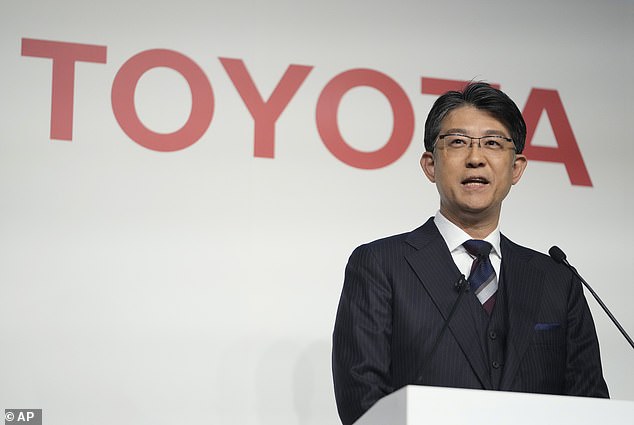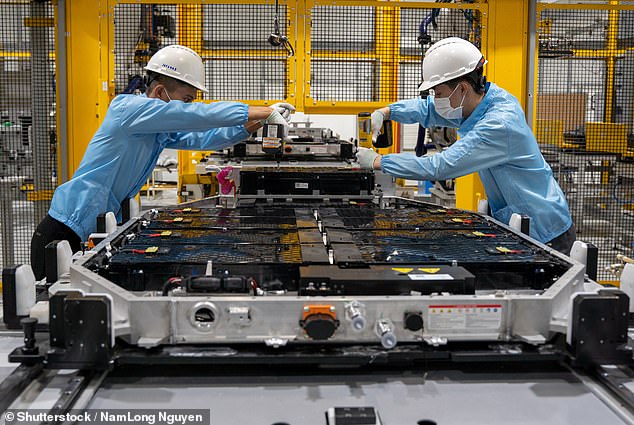The Tesla killer? Toyota’s EV breakthrough will allow cars to travel 745 miles on a single 10 minute charge – more than DOUBLE the range of most existing electric vehicles
- Toyota says its new batteries would provide a range of 750 miles and a 10-minute charging time
- An engineer at the company said it is close to being able to mass-produce them
- Production would be limited initially, but the CEO said they could arrive in 2027
Toyota has said it is close to being able to mass produce potentially revolutionary solid-state batteries that could double the range of existing electric cars.
According to Toyota, cars powered by solid-state batteries could have a range of 750 miles, a charging time of 10 minutes, and hit the market in 2027 or 2028.
They have been presented by experts as a revolutionary technology That could make electric cars mainstream.
Switching to an electric vehicle is out of reach for many Americans, experts warn, as a lack of access to charging ports leaves them afraid of getting stuck in vehicles with shorter range.
The driving range of electric cars varies by model, but is typically around 500 kilometers.
Toyota has said it is “close” to mass-producing potentially revolutionary solid-state batteries that could double the range of existing electric cars. The photo shows a worker cleaning an electric Toyota bZ4X in Indonesia

Earlier this month, Toyota CEO Koji Sato announced that the company would partner with major Japanese oil refiner Idemitsu Kosan to produce the batteries.
While solid-state batteries can be revolutionary, they also present challenges for manufacturers. According to Toyota, one of the main hurdles is the assembly process, which requires layers of cathode and anode cells to be stacked quickly and accurately.
Claims that Toyota is about to produce solid-state batteries on a large scale were the first published in the Financial Times on Monday.
‘We are almost there in terms of stacking speed. We will roll out larger volumes and check the quality,” an engineer from the company told the outlet.
Earlier this month, Toyota CEO Koji Sato announced that the company would collaborate with major Japanese oil refiner Idemitsu Kosan on the project to produce the batteries.
“With repeated trial and error efforts, we have managed to develop a material that is more stable and less prone to cracking,” Sato told reporters in Tokyo during an announcement with Idemitsu.
“The future of mobility lies in the connection between the automotive and energy sectors, including this innovation from Japan,” he said.
Toyota’s push comes at a time when sales of EVs in the US have collapsed, and auto experts suggest that a combination of their high price and limited range has deterred American motorists.
The average electric car sold in the US is approaching 300 miles of range, according to a Bloomberg analysis of EV sales earlier this year. And the average range of model year 2021 petrol cars was according to a report from the US Department of Energy.
And controversial liquid lithium-ion batteries have long been at the center of criticism surrounding electric vehicles, given their limited recyclability and reliance on lithium mining and fire risk.

Toyota claims it has achieved a technological ‘breakthrough’ that will allow it to produce batteries at the same pace as existing electric vehicle batteries. Pictured is the inside of an electric vehicle battery store at a VinFast factory in Haiphong, Vietnam
Solid state batteries offer faster charging times, greater capacity and longer lifespan, and according to a recent report, they can reduce the carbon footprint of EVs by almost a quarter.
Although the solid-state batteries are difficult to produce, Toyota claims it has made a technological ‘breakthrough’ that will make it possible to produce them the same rate as existing batteries for electric vehicles.
Toyota hopes the development will allow it to make up for losses to Tesla and increasingly dominant Chinese rivals such as BYD, but has admitted initial production will be small.
“I think the most important thing right now is to bring the solid-state batteries to the world and from there we will consider expanding the volume,” Sato said.
Many other top automakers are also working on solid-state batteries, including Nissan and Ford.
